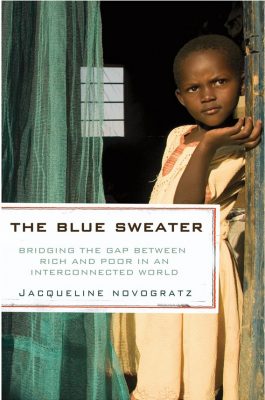Review
By
James Ouma
The Blue Sweater is an inspiring true story based on Jacqueline Novogratz who quit a promising career in international banking at Chase Manhattan to help bridge the gap between the rich and poor. It all begun with a blue sweater which she owned and loved while growing up. As she became a teenager and boys started mocking her, she gave away the sweater.
Eleven years down the line she arrived in Rwanda where she met a boy who was wearing the sweater. From that moment Jacqueline knew we live in a world that is interconnected through our action or lack of it.
Each chapter begins with a quote from people whose lives have made an impact on the author’s life. The book details the author’s experience as she sets out to save Africa from itself only to end up upsetting the status quo.
She shares her heartbreak at being misunderstood and at the same time misunderstanding and getting frustrated by the same women whose lives she is trying to transform.
It is both hilarious and gripping at the same time as Jacqueline recounts her experience with all kinds of women across the continent of Africa.
Her encounter with women in Abidjan goes a long way in showing how people who have good intentions seldom get the chance to play a positive role in bringing change. She also believes that giving handouts by donors to the poor doesn’t result in economic empowerment and independence to recipients of such charity.
Her personal struggle to come to terms with her decision to quit her job and her parents’ reluctance to allow her to chart her own road map to success shows that this is a universal trend and not unique to our nation where parents want to have the last word where career is concerned.
Her determination to pursue and see through her plans is a good example to those who seek to fulfill their personal goals and dreams. Her success is an ideal example of how determination, courage and taking risks can result into a happy and fulfilling life.
For Novogratz, success lies in maintaining a slow and steady approach to investing in the poor as opposed to giving them handouts. She writes about the growth of a bakery that was founded and owned by a community of women in Rwanda through Duterimbere; a micro-finance project for women.
The Blue Sweater is an ideal book for every person whose mind is focused on transforming the world. It shows that everything is possible for those who pursue social and economic change in a world where the gap between rich and poor keeps growing wide.
And with our nation crying out for change, many change makers will have a head start, an insider knowledge, on how change can be effected when they read the writer’s amazing journey. This book is a call to action to parents to allow their children to chart their own path to excellence and a purposeful life.
When you allow your child to soar on their own wings, they operate at a higher level that changes the world and those around them. I highly recommend The Blue Sweater to every parent and every person getting into university out there. Your life will never be the same again after you have turned the last page.
Title: The Blue Sweater: Bridging the Gap Between the Rich and Poor in an Interconnected World
Author: Jacqueline Novogratz
Publisher: Longhorn Publishers
About the Author
Jacqueline Novogratz is founder and CEO of Acumen Fund which invests and empowers the poor to develop and profit from sustainable eco¬nomic ventures.
Since its inception, the Acumen Fund has invested more than $40 million that has created thousands of jobs across the world.




Thank you for making the time to read my book and write this generous review. It means a lot. To effect the kind of change we need in our interconnected world will require all of us. And there is so much more to do!
Jacqueline Novogratz, Reading The Blue Sweater inspired me to continue believing that change is possible even without resources in the initial stages of projects. It is what inspired me to keep working and sharing as I continue using buttons, sewing thread and reading to change the lives of children and young people in juvenile prison, rehab and informal schools. I look forward to reading and reviewing your next book.